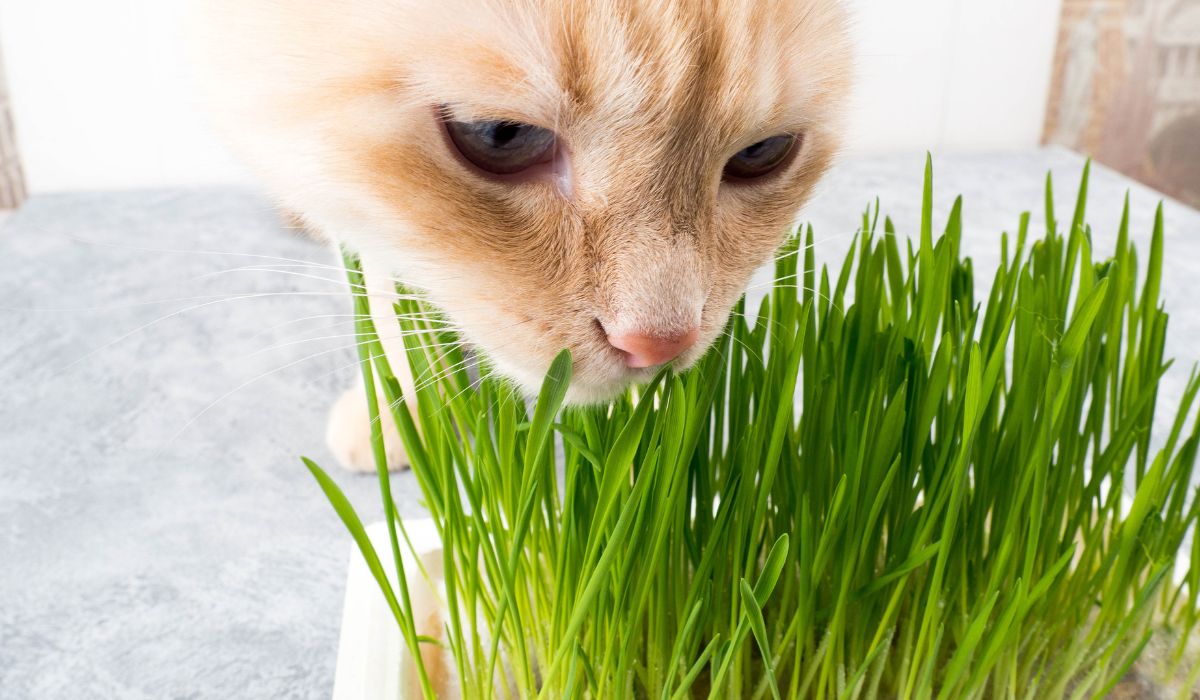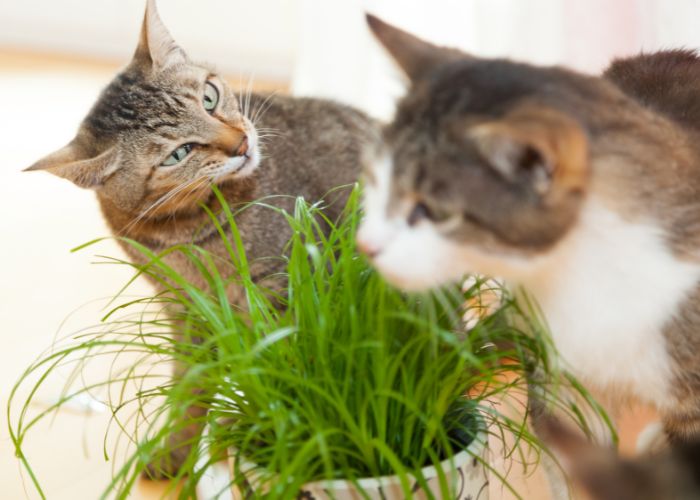Having this beautiful bush in your garden is always a treat for the eyes, but can cats eat lemongrass? Before growing this healing plant, you should know how it will affect your pets.
Lemongrass is known for its many healing properties, fresh and light lemony smell, and long green stalks. It makes an attractive addition to any garden, but if you have pets who like to explore, you should know if this plant is safe for them to consume.
IMPORTANT: At stuffaboutcats.com, we regularly consult with licensed veterinarians and other industry experts. However, the information found on stuffaboutcats.com should not be viewed as veterinary advice. We do our best to help you better understand your cats, but the information on this blog is not a substitute for veterinary guidance.
In this article, I share whether cats can eat lemongrass and what will happen to their bodies if they do.
Can Cats Eat Lemongrass?
Lemongrass is slightly toxic to cats, but they should be fine if they consume minimal amounts. It is nearly impossible for a cat to eat enough lemongrass to be fatal or make them very ill.
All types of lemongrass contain citronella oil which is the toxic part.
Read more about Is Lemongrass Bad For Cats?
How Can Lemongrass Heal Cats?
Although lemongrass is mildly toxic to your cat, it may hold some benefits. Ensure that you grow Andropogon Citratus Lemongrass and not the Citronella Grass for your cat to experience these benefits!
Citratus Grass is packed with minerals like calcium, magnesium, potassium, iron, folate, vitamin C, and sodium. It’s also full of electrolytes. This is how your kitty can benefit when eating it:
Digestion
Lemongrass aids in the digestive health of your feline and eases stomach pain. It reduces inflammation in the stomach and helps your cat produce regular stool with its anti-diarrheal properties.
Cancer
Lemongrass is a cancer cell killer, and some health-gurus claim that it’s as powerful as chemotherapy. If your kitty has cancer, feeding them lemongrass can help their body fight off cancer by improving the strength of their healthy cells.
Pain Reliever
Lemongrass relieves pain in your cat’s body in all areas, including headaches and toothaches. It acts as a pain blocker and stops any pain right in its tracks. The anti-inflammatory benefits of this grass also aid in relieving the burn of acid reflux and other traces of inflammation in your kitty’s body.
Tick and Flea Repellent
The citronella in lemongrass acts as a natural tick and flea repellent. These annoying little bugs despise the smell of lemongrass and citronella and will stay away from your cat, decreasing the chances of your kitty developing tick fever.
Antifungal and Antibacterial
Lemongrass can act as an antifungal and antibacterial medium, helping to fight bacteria and fungi on your felines’ skin.
Antioxidant
Ironically, while being mildly poisonous itself, lemongrass is an excellent antioxidant that will remove all toxicity from your cat’s body.
How Much Lemongrass Can Cats Eat?
Lemongrass should be consumed in the smallest amount possible because it can quickly turn toxic for your kitty.
If you give your cat lemongrass, you’ll control the amount, but keep an eye on them in the garden. Too much lemongrass can lead to lemongrass poisoning.
Lemongrass Poisoning From Essential Oils
Lemongrass in plant form should literally be consumed in wheelbarrows to affect your cat. Still, in the unlikely situation that they consume this much, an internal blockage can occur, which could be painful and dangerous.
Lemongrass is typically only fatal for felines when made into an essential oil. Most essential oils could be potentially fatal to your kitty, and unfortunately, lemongrass is one of them when misused.
Lemongrass poisoning from essential oils is more common than you may think and extremely dangerous.
Symptoms of Lemongrass Poisoning
If your feline displays any of the following symptoms after ingesting lemongrass, it may be poisoned. You should immediately get them to your vet!
- Abdominal pain
- Swollen abdomen
- Any signs of an upset stomach or damaged intestines (like diarrhea or blood in the stool)
- Vomiting
- Fever
- Shock
- Loss of appetite
- Urine leakage
- Inability to pass stools
- Weakness in their legs
Treatment Of Lemongrass Poisoning
Internal Blockage: If your kitty consumed too much lemongrass and obtained an internal blockage, they’ll need surgery to remove this obstruction.
Lemongrass Poisoning: Lemongrass poisoning from essential oils is treated as a severe condition. Your vet will likely force your cat to vomit by using activated charcoal. This antioxidant will remove most toxins from their body and put them well on the path to recovery. After this, your kitty will need to stay over at the vet for observation. Your vet will monitor them for liver damage.
Mild Symptoms: Your cat will receive fluid through an IV drip if they rehydrate due to mild lemongrass poisoning. Sometimes, the vet will only need to prescribe medicine for nausea and vomiting.
In Summary
Lemongrass is typically used as an essential oil, and in this form, cats should avoid ingesting it. If your kitty nibbles on some fresh lemongrass in your garden, the chances that they’ll experience an adverse reaction are slim.
This healing plant holds many benefits for your feline friend, and you can serve it to them as a treat or mixed with their regular meals. When you feed your cat lemongrass, always watch them see how their bodies respond.
I hope this article helps you decide whether to give your kitty lemongrass or not. I know mine likes its smell, and when they take a little bit, I don’t protest. If you have any other questions about cats eating lemongrass or other garden herbs you have, ask them in the comments!
Why does my cat eat lemongrass?
Most cats eat lemongrass because they like the smell, but if you notice your kitty constantly nibbling on it, they might be fighting an underlying disease or have a nutritional deficiency.
Do cats like the lemongrass plant?
Yes.
The lemongrass plant is extremely attractive to cats, and they love gnawing on it.
Will lemongrass repel cats?
Excessive amounts of lemongrass will repel cats, but a few plants will be in their taste.
What happens if a cat eats lemongrass?
If your cat eats lemongrass in moderation, they'll be perfectly fine! Just remember to still keep an eye on them for any signs that their bodies aren't tolerating it well.
Learn more about Is Lemon Juice Bad For Cats?

